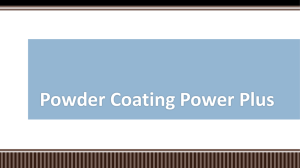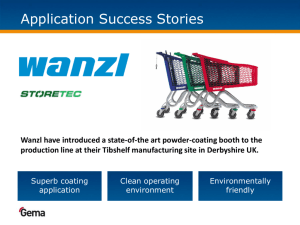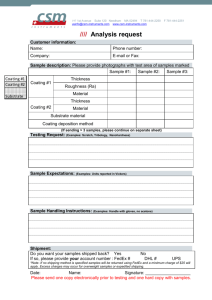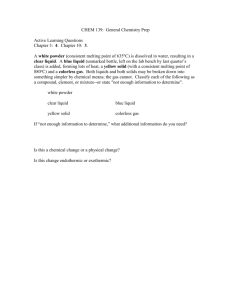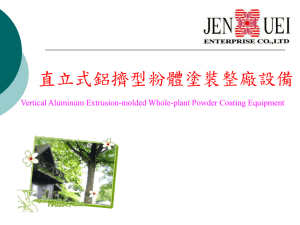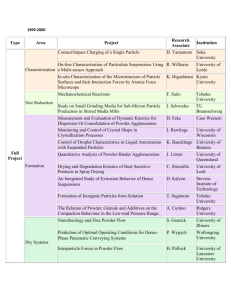Radtech Webinar UV-Cured Powder Coating + Resource Productivity
advertisement
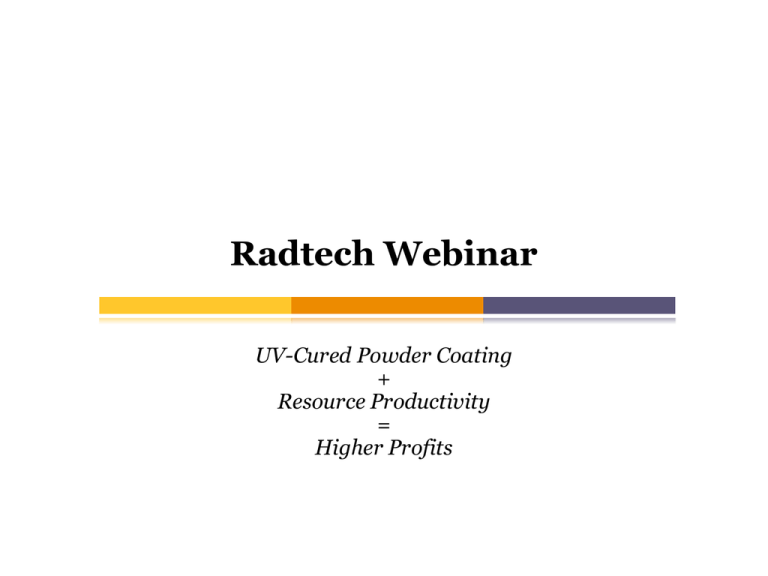
Radtech Webinar UV-Cured Powder Coating + Resource Productivity = Higher Profits Keyland Polymer, LLC Manufacturer of UV-Curable Powder Coatings DVUV Holdings, LLC Keyland Polymer, LLC. Est. 2006 Develop, formulate & manufacture UV- cured powder coatings DVUV, LLC Est. 2005 Applicator of UV-cured powder coatings manufacturing finished components DVUVSystems Est. 2010 UV-cured application systems – design, engineering, operating consultants Sole focus on UV-Cured Powder Coatings Powder – Application - Systems 3 Goal of Presentation Using the book Resource-Production Operations: Five Core Beliefs to Increase Profits Through Leaner and Greener Manufacturing Operations by Markus Hammer and Ken Somers of McKinsey & Co. as a guide this webinar will take the participant on a journey that will demonstrate that adoption of UVCured Powder Coating can be a “higher profit” material and process finishing solution. UV-Cured Powder Coating Clean Fast Green 5 UV-Cured Powder Coating UV-cured powder coating has been around for more than a decade and has achieved modest market penetration, mostly as a coating for medium density fiberboard (MDF). Significant improvements in functionality, corrosion and other physical properties is broadening the reach of UVcured powder. A more than suitable replacement for solvent based and solvent containing liquid coatings, in some cases replacing thermal powder coatings and other finishing materials and processes. This increasing market penetration corresponds to the development and implementation of the business strategy known as Resource Productivity. UV Powder Coating The differentiating characteristic of UV-curable powder coating is the separation of melt & flow from cure Melt, Flow & Cure 5 to >60 mins + cooling Thermal Powder Coating UV Powder Coating Substrate Pretreatment 7 Electrostatic Powder Deposition Melt & Flow 1-2 minutes UV Cure (seconds) Minimal cooling Finished Product Powder Coating Time & Temperature 160 140 Hold Temperature Temperature (°C) 120 Leave Melt/Cure Exit Melt/UV Oven 100 Enter Application Leave Preheat 80 UV 60 Thermal 40 Start Enter Preheat 20 Enter Melt/UV Oven Enter Melt/Cure End End 0 0 5 10 15 20 25 30 35 Minutes System Description Length Ft UV 200 Thermal 321 Speed Ft/Min 10 10 Preheat Time Min 1 2 1 part change = 2 line rotations Melt/Cure Time Min Plant Size Sqft Avg Parts/hr 1 2500 550 5 6440 520 kWh 158 461 Application on Various Substrates 3D ABS Aluminum Assembled product Carbon Fiber Wood MDF panels 9 Coating Industry Today Paints and coatings market* Global coatings market demand 80 billion pounds - US$120 billion 2013 and will grow to 102 billion pounds – US$150 billion in 2018 Solventborne & solvent containing liquid coatings 88% by value & 92.7% by volume 2013 Projected global growth rate of 5% through 2018 UV-curable coating market as a segment of the global market* 2.5% by value & 0.88% by volume - 2013 2.73% by value & 0.83% by volume - 2018 * APCJ , April 2014 Coating Industry Tomorrow UV-Curable coating technology is increasingly being seen as the future technology in the area of industrial coatings. The technology represents one of the rapidly growing segments in the coatings industry, and is arguably emerging as the answer to the rising environmental concerns and stringent regulations. Several application related advantages come to serve the technology that include absence of pot life issues, lower energy costs, fast cure speed, and reduced environmental impact. As such, one-component UV-Curable coating ranks among the fastest coating chemistries available in the present context. Curing takes a few seconds to a few minutes, which makes it more ideal for use in applications that require faster turnaround time. Global Industry Analysts, Inc. March 2012 11 Scope of Presentation Convergence of UV-Cured Powder Coating and Resource Productivity • Adoption of UV-Cured Powder Coating is a CAPEX investment driven by demand to increase profits Key component in a value adding manufacturing system Replacement of an obsolete or constrained finishing system • UV-cured powder coating will increase resource productivity and increase profits Increase profits per hour - production speed and process flexibility Lower energy consumption per unit of product produced – less energy per part Increase plant floor utilization – smaller plant footprint Reduce environmental impact – less total energy & waste product repurpose Resource Productivity Resource productivity is the quantity of good or service (outcome) that is obtained through the expenditure of unit resource. This can be expressed in monetary terms as the monetary yield per unit resource. Sales per labor hour Sales per employee Sales per machine hours Sales per square foot of plant Sales per kWh or BTU The use of fewer resources to make more money and increase return to shareholders.1 1 Markus Hammer, Ken Somers Resource-Productive Operations, Five core beliefs to increase profits through leaner and greener manufacturing operations McKinsey & Company, Page 22 The High Cost of Low Cost “How much does it cost per pound?” The most asked question and a good indication that the asker is not getting the “right cost” and limiting profit potential, by asking the wrong question. Ignores the costs of misuse or misallocation of resources. The Right Question is How do I make more profit with less resources in today’s customer driven and product segmented market, by minimizing the influence of resource constraint & volatility? Resource Demand and Constraints McKinsey & Company Accelerating Demand and Supply Constraints Leads to Price Volatility McKinsey & Company Energy Cost Projections Natural gas cost projections 2013 – 2040 $/1mm BTU Source: History: U.S. Energy Information Administration, Natural Gas Annual 2013, DOE/EIA-0131(2013) (Washington, DC, October 2014). Projections: AEO2015 National Energy Modeling System, runs REF2015.D021915A, LOWPRICE.D021915A,HIGHPRICE.D021915A,and GHRESOURCE.D021915B. Electricity cost projections 2013 – 2040 $/kWh Source: AEO2015 National Energy Modeling System, runs REF2015. D021915A, LOWPRICE.D021915A, HIGHPRICE.D021915A, LOWMACRO.D021915A, HIGHMACRO.D021915A, and HIGHRESOURCE.D021915B. Five Core Beliefs Resource-Production Operations: Five Core Beliefs to Increase Profits Through Leaner and Greener Manufacturing Operations by Markus Hammer and Ken Somers of McKinsey & Co. • Five Core Beliefs Think Lean Think Limits Think Profits per hour Think Holistic Think Circular Lean The identification, quantification and elimination of factors/costs/activities that do not add value or contribute to profit Wasted/excessive energy Excessive floor space Job set up or part change Disruption of material flow causing lost production time Results are based upon system description on slide #8 and are solely for illustration purposes. The model allows for a 25% higher cost of UV-cured powder coating Part change is the only introduced constraint variable The purpose of the model is to demonstrate trend as constraint is introduced Annual Cost of Energy $100,000 500 $90,000 450 $80,000 400 $70,000 350 $60,000 300 $50,000 250 $40,000 200 $30,000 150 $20,000 100 $10,000 50 $0 UV Thermal Powder Systems - kWh Energy Cost Annual Energy Cost to Operate Ovens and UV UV Oven Annual Cost of Plant Footprint 10000 $120,000 9000 $100,000 8000 7000 $80,000 Sq. Ft. 6000 5000 $60,000 4000 $40,000 3000 2000 $20,000 1000 0 UV Thermal Powder Systems $0 Operation Efficiency Annual Total Variable Cost and Revenue Analysis Optimum and 3 Part Changes Per Day $12,000,000.00 $10,000,000.00 $8,000,000.00 Total Cost $6,000,000.00 UV Total Revenue Thermal Total Revenue $4,000,000.00 $2,000,000.00 $0.00 Optimum UV Optimum Thermal Adjusted UV Adjusted Thermal Annual Production Hours Lost 2500 2000 Hours 1500 UV Thermal 1000 500 0 1 3 5 7 8 Limits What is the optimum production output? • Volume of produced product per unit of time increment without any constraints What is the impact on optimum output with the introduction of a constraint? For the purpose of illustration the model uses part changes per day as the constraint. Change in variable cost Change in parts produced Change in revenue generated Change in profit per hour Change in lost production hours Capacity Model Annual Total Parts Produced 1,200,000 1,000,000 Units 800,000 600,000 UV Thermal 400,000 200,000 0 Optimum capacity 1 3 5 Part Changes Per Day 7 8 Total Variable Cost $5.40 $5.27 $5.30 $5.20 $5.11 Variable Cost Per Part $5.15 $5.13 $5.07 $5.10 $5.00 $4.97 UV $4.90 Thermal $4.80 $4.70 $4.60 $4.50 Opt 3 Part Changes Per Day 5 Total variable cost = material + labor + energy + plant floor + allocated energy & plant floor for lost production Profits per Hour of Operation Total revenue – Total variable cost ÷ Total hours = Profit/hr Profits Per Hour of Operation 2000 hour year $3,000 $2,500 $2,000 $1,500 $1,000 $500 $0 Opt -$500 1 3 5 Part Changes Per Day UV Thermal 7 8 Holistic Combination of managerial, technological process and material skill sets to produce a successful outcome. • Systems have to integrate and function in concert • Process managers and implementers have to be engaged • Collaboration with supply and support channels Technical Managerial Mindset Market & Customer Expectation Formulation Technology Production Process The Supply Circle Focuses on value creation Restoration of resources back into the value chain – materials – energy – labor Recycle– Replenish – Reuse – Resell – Restore McKinsey & Company Call to Action Worldwide demand and competition for resources will continue grow at accelerating rates. Resource constraints and cost volatility affect all firms. Production capacities need to be modified or created with mechanisms and processes to minimize and manage the negative influences of resource constraints and volatility. Resource Productivity and the 5 core beliefs are quantitative and qualitative tools and methods that when employed can relieve or minimize constraints and volatility on energy, space, time and materials. UV-cured powder coating is an exceptionally robust finishing system well suited for a wide variety of material and product applications fitting within the scope of a Resource Productivity business strategy. The adoption of UV-cured powder coating improves production flexibility, saves energy and plant space, is environmentally friendly and most importantly produces higher profits. Questions Keyland Polymer, Ltd. 4621 Hinckley Industrial Parkway Cleveland, OH 44109 216-741-7915 info@keylandpolymer.com www.keylandpolymer.com Michael Knoblauch mfk@keylandpolymer.com 216-849-0342 Thanks to: Evan Knoblauch Rebecca Rutherford
